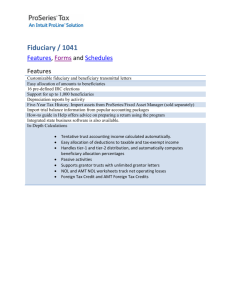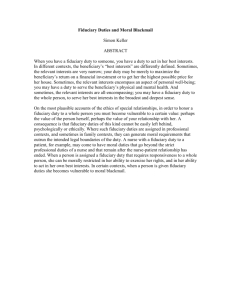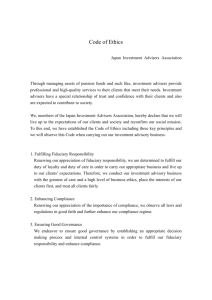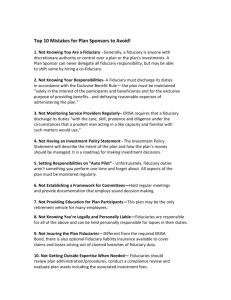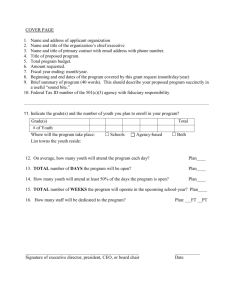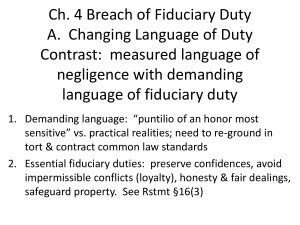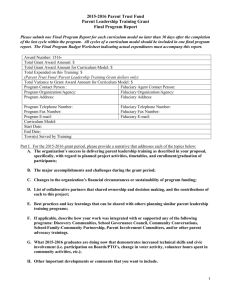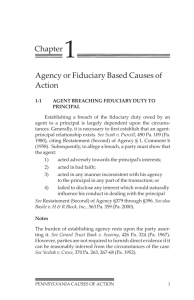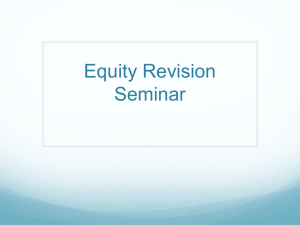Restat 2d of Torts, § 874
advertisement
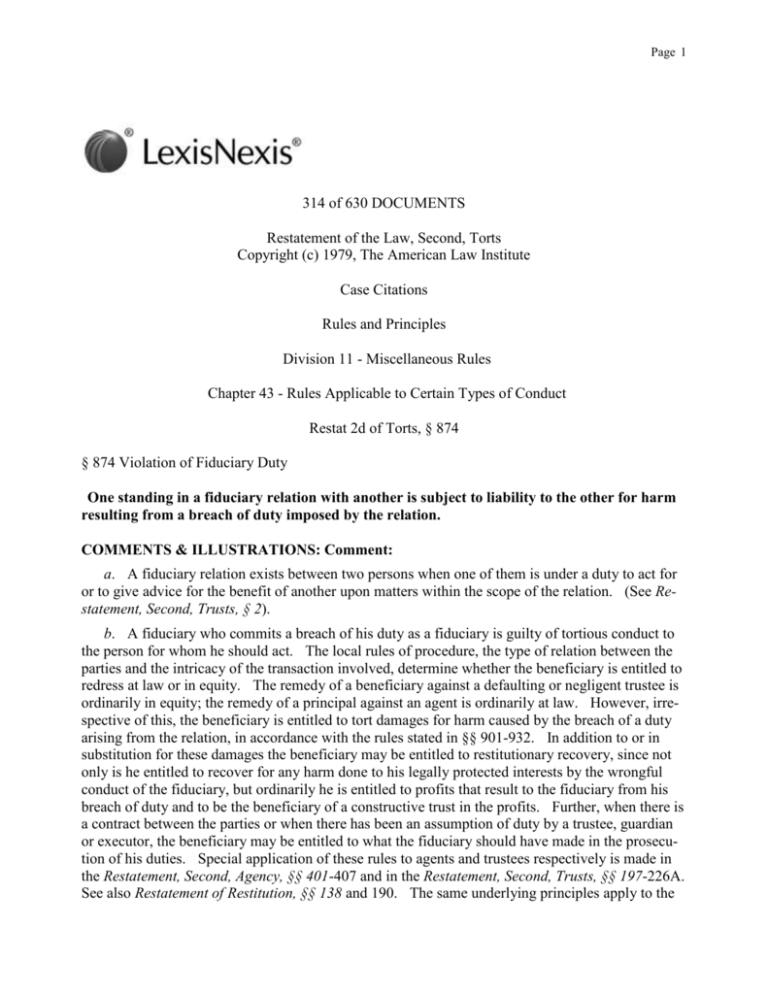
Page 1 314 of 630 DOCUMENTS Restatement of the Law, Second, Torts Copyright (c) 1979, The American Law Institute Case Citations Rules and Principles Division 11 - Miscellaneous Rules Chapter 43 - Rules Applicable to Certain Types of Conduct Restat 2d of Torts, § 874 § 874 Violation of Fiduciary Duty One standing in a fiduciary relation with another is subject to liability to the other for harm resulting from a breach of duty imposed by the relation. COMMENTS & ILLUSTRATIONS: Comment: a. A fiduciary relation exists between two persons when one of them is under a duty to act for or to give advice for the benefit of another upon matters within the scope of the relation. (See Restatement, Second, Trusts, § 2). b. A fiduciary who commits a breach of his duty as a fiduciary is guilty of tortious conduct to the person for whom he should act. The local rules of procedure, the type of relation between the parties and the intricacy of the transaction involved, determine whether the beneficiary is entitled to redress at law or in equity. The remedy of a beneficiary against a defaulting or negligent trustee is ordinarily in equity; the remedy of a principal against an agent is ordinarily at law. However, irrespective of this, the beneficiary is entitled to tort damages for harm caused by the breach of a duty arising from the relation, in accordance with the rules stated in §§ 901-932. In addition to or in substitution for these damages the beneficiary may be entitled to restitutionary recovery, since not only is he entitled to recover for any harm done to his legally protected interests by the wrongful conduct of the fiduciary, but ordinarily he is entitled to profits that result to the fiduciary from his breach of duty and to be the beneficiary of a constructive trust in the profits. Further, when there is a contract between the parties or when there has been an assumption of duty by a trustee, guardian or executor, the beneficiary may be entitled to what the fiduciary should have made in the prosecution of his duties. Special application of these rules to agents and trustees respectively is made in the Restatement, Second, Agency, §§ 401-407 and in the Restatement, Second, Trusts, §§ 197-226A. See also Restatement of Restitution, §§ 138 and 190. The same underlying principles apply to the Page 2 Restatement of the Law, Second, Torts, § 874 liability of other fiduciaries, such as administrators and guardians; the liability is not dependent solely upon an agreement or contractual relation between the fiduciary and the beneficiary but results from the relation. c. A person who knowingly assists a fiduciary in committing a breach of trust is himself guilty of tortious conduct and is subject to liability for the harm thereby caused. (See § 876). The measure of his liability, however, may be different from that of the fiduciary since he is responsible only for harm caused or profits that he himself has made from the transaction, and he is not necessarily liable for the profits that the fiduciary has made nor for those that he should have made. Specific applications of the rule are made in the Restatement, Second, Agency, §§ 312 and 313 and in the Restatement, Second, Trusts, §§ 280-326. The same principles are applicable when one has colluded with other types of fiduciaries. REPORTERS NOTES: Some fiduciary relations, such as those of trustee and beneficiary, principal and agent and director and corporation are the subject of a considerable group of substantive rules of law; and a breach of fiduciary duty has usually been regarded as controlled by the substantive law rules governing the relationship. But the action may properly be regarded as in tort for damages, being an equitable tort even when the action is in the traditional scope of equitable jurisdiction. Appropriate sections of the Restatements of Agency and Trusts, for example, are cited in the text. One breach of fiduciary duty that is more commonly regarded as giving rise to an action in tort is the disclosure of confidential information. See, for example, Horne v. Patton, 291 Ala. 701, 287 So.2d 824 (1973); Cannell v. Medical & Surgical Clinic, 21 Ill. App.3d 383, 315 N.E.2d 278 (1974); Felis v. Greenberg, 51 Misc.2d 441, 273 N.Y.S.2d 288 (1966); Doe v. Roe, 93 Misc.2d 201, 400 N.Y.S.2d 668 (1977); Schaffer v. Spicer, 215 N.W.2d 134 (S.D.1974). Comment c. One who assists a fiduciary in committing a violation of his duty is also guilty of a tort. See Rowen v. Le Mars Mutual Ins. Co. of Iowa, 282 N.W.2d 639 (Iowa 1979). CROSS REFERENCES: ALR Annotations: Bank's duty to customer or depositor not to disclose information as to his financial condition. 92 A.L.R.2d 900. Liability of public accountant. 54 A.L.R.2d 324. Liability of incompetent's estate for torts committed by guardian, committee, or trustee in managing estate. 40 A.L.R.2d 1103. Digest System Key Numbers: C.J.S. Trusts § 252. West's Key No. Digests, Trusts 235. Legal Topics: For related research and practice materials, see the following legal topics: GovernmentsFiduciary Responsibilities
